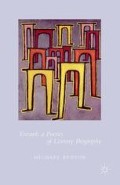Abstract
When biographers are challenged, as they still are, with that old chestnut that their work lacks a grounding in theory, they typically react either with a dismissive shrug or parry the attack and deliver an adroit counter thrust. So, Park Honan remarks that biographers ‘as a rule are not concerned with theory’,2 suggesting that they have better things to do in researching their particular subjects; and Barbara Lewalski points out that, ‘Postmodern literary theory, with its emphasis on the instability and undecidability of both texts and history, challenges the fundamental assumptions of biography, which has to ground itself on empiricism, probability, and narrative’,3 suggesting, since she goes on to write a substantial ‘Life’ of Milton, that biographers can sit out the passing squalls of an uncongenial intellectual climate, confident in the solid foundations of their work, and hope that the weather improves. If there is an element of defensiveness in these reactions it is understandable since the emphasis on ‘theory’ in the past fifty years has carried with it the implication that any genre lacking such a grounding is not making a serious contribution to literary studies. Yet, the hollowness of this challenge is exposed if we ask what sort of theory such critics have in mind.
From the mid to late 20th century, it was often noted (regretfully, or happily) that biography ‘has remained notably untheorised’, that it has had ‘a lack of legitimacy in the worlds of contemporary critical theory [and] social historiography’.
(Hermione Lee, Biography: A Very Short Introduction, 2009)1
Access this chapter
Tax calculation will be finalised at checkout
Purchases are for personal use only
Preview
Unable to display preview. Download preview PDF.
Notes and Reference
Hermione Lee, Biography: A Very Short Introduction (Oxford University Press, 2009), 94.
Lee is running together remarks by Ian MacKillop, ‘Vignettes: Leavis, Biography and the Body’ in W. Gould and T. Staley, eds., Writing the Lives of Writers (Macmillan, 1998), 297;
and by Mary Rhiel and David Suchoff (eds.), Introduction to The Seductions of Biography (Routledge, 1996), 1.
Barbara Lewalski, The Life of John Milton (Blackwell Publishing, 2003), x.
Jonathan Culler, ‘Chapter 1. What is Theory?’ in Literary Theory: A Very Short Introduction (Oxford University Press, 2000), 1–17.
Hayden White, ‘The Discourse of History’ in The Fiction of Narrative: Essays on History, Literature and Theory 1957–2007, ed. R. Doran (The Johns Hopkins University Press, 2010), 200.
Leon Edel, Writing Lives: Principia Biographia (Norton, 1984).
Linda Anderson, Autobiography (Routledge, 2001), 13–14.
Paula Backscheider, Reflections on Biography (Oxford University Press, 1999), 93.
David Novarr, The Lines of Life: Theories of Biography, 1880–1970 (Purdue University Press, 1986), 152.
Susan Tridgell, Understanding Ourselves: The Dangerous Art of Biography (Peter Lang, 2004);
Nigel Hamilton, Biography: A Brief History (Harvard University Press, 2009).
James Boswell (1791), The Life of Dr Johnson, 2 Vols. (J. M. Dent & Sons, 1949);
Jonathan Coe, Like a Fiery Elephant: The Story of B. S. Johnson (Picador, 2004).
Helen Gardner, ‘Literary Biography’ in In Defence of the Imagination (Oxford: Clarendon Press, 1984), 168–9.
Samuel Johnson, ‘The Rambler, No. 60, Saturday October 13, 1750’. Reprinted in Richard Holmes, ed., Johnson on Savage (Harper Perennial, 2005), 111–15.
Lytton Strachey, Eminent Victorians, ed. Michael Holroyd (Penguin, 1986), 9.
Strachey cited in Michael Holroyd, Lytton Strachey: The New Biography (Vintage, 1994), 420.
Richard Holmes, Footsteps: Adventures of a Romantic Biographer (1985), (Flamingo, 1995).
E. H. Carr, What is History? (1961), (Palgrave Macmillan, 2001), 24.
Richard Holmes, ‘Biography. Inventing the Truth’ in J. Batchelor, ed., The Art of Literary Biography (Oxford: Clarendon Press, 1995);
Richard Holmes, ‘The Proper Study?’ in P. France and W. St. Clair, eds., Mapping Lives: The Uses of Biography (Oxford University Press, 2002).
Julian Barnes, The Sense of an Ending (Jonathan Cape, 2011), 17.
Author information
Authors and Affiliations
Copyright information
© 2015 Michael Benton
About this chapter
Cite this chapter
Benton, M. (2015). Introduction: Lives Without Theory. In: Towards a Poetics of Literary Biography. Palgrave Macmillan, London. https://doi.org/10.1057/9781137549587_1
Download citation
DOI: https://doi.org/10.1057/9781137549587_1
Publisher Name: Palgrave Macmillan, London
Print ISBN: 978-1-349-57924-2
Online ISBN: 978-1-137-54958-7
eBook Packages: Palgrave Literature CollectionLiterature, Cultural and Media Studies (R0)

